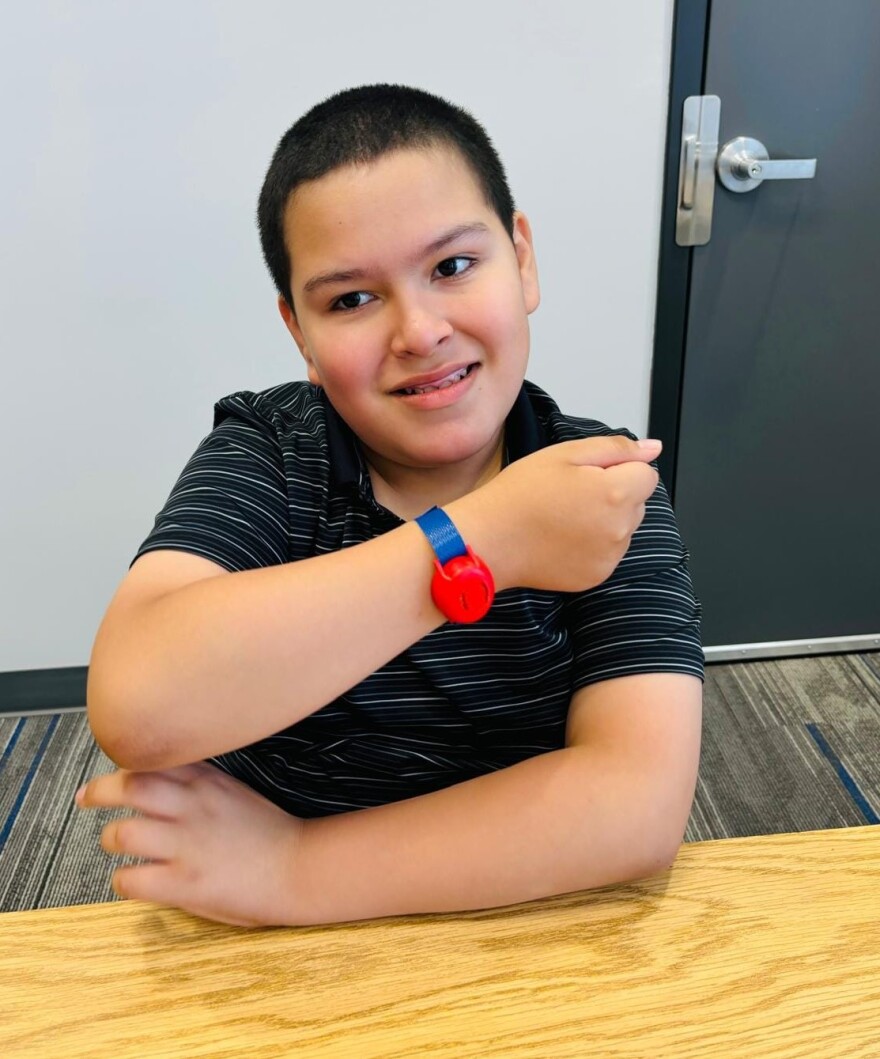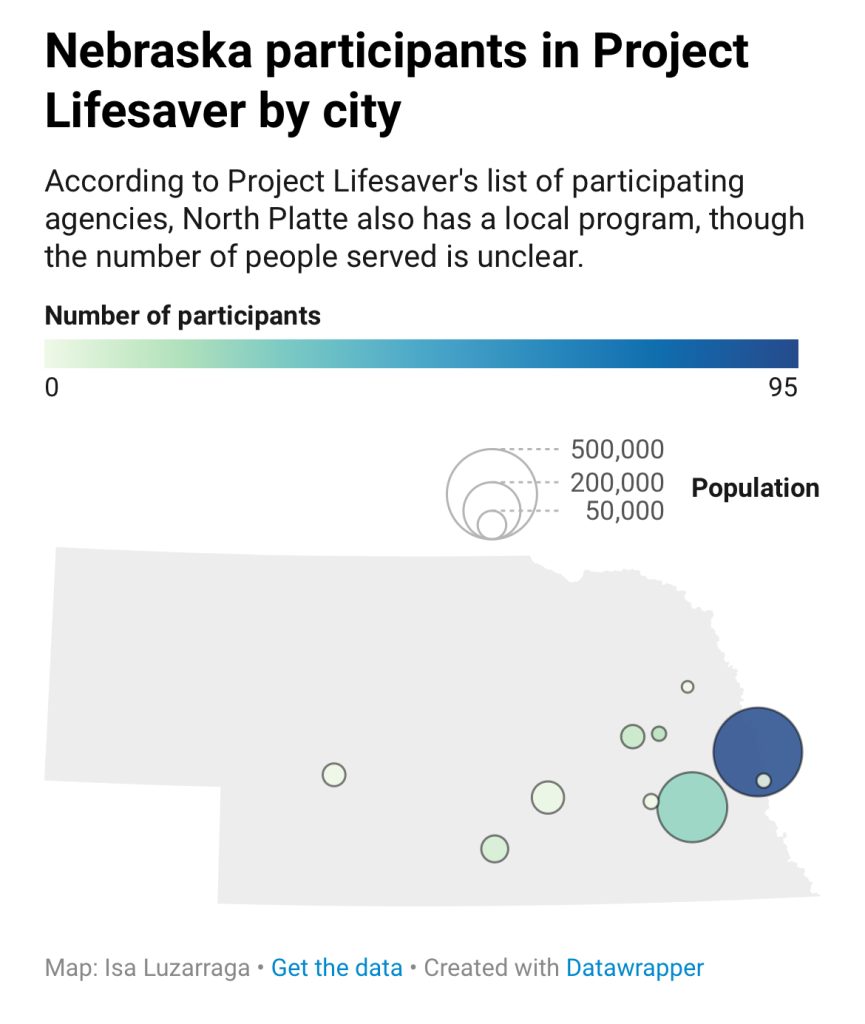Rosa Pinto Barba, a Peruvian immigrant, moved to Columbus, Nebraska at 16. She spoke no English at the time, but Pinto Barba remembers how welcomed she felt when she started at Columbus High School. Then, Pinto Barba had no idea community organizing was a possible career, much less one that would lead her to a group of women and children that would change her life forever.
During her first week of training for her new job as a community organizer at the Heartland Workers Center in 2022, Pinto Barba attended the first meeting of a new support group for Latina mothers with disabled children. With the support of Luis Lucar, senior organizer at the Center, the four mothers from Schuyler, Nebraska gathered to share their experiences in their native language.
The mother of an autistic son, Pinto Barba felt an overwhelming sense of serendipity.
“Everything was God’s timing,” she said.
Since then, Corazones Azules — which translates to “Blue Hearts” in Spanish — has expanded beyond Schuyler. Pinto Barba started a group in Columbus, and both Fremont and Omaha now have chapters.
The original Schuyler group formed to learn from each other’s experiences of raising disabled children, including navigating medical care and community acceptance. Their reach broadened when the City of Schuyler declared a week in honor of Corazones Azules last summer. Most recently, they have helped the local police department raise over $23,000 to fund Project Lifesaver.

Project Lifesaver is an international search and rescue program that provides GPS-tracking bracelets to people at risk of getting lost. Most commonly, these are people with dementia and developmental disabilities such as autism and Down syndrome. Local law enforcement agencies and as well as search and rescue teams provide the bracelets and house the equipment that tracks them.
‘The need is there’
Members of Corazones Azules had discussed the possibility of instituting Project Lifesaver in Schuyler over a year ago. Sergeant Cheyne Terrell of the Schuyler Police Department first heard about the program from a friend who has a child with Down syndrome. He helped her look for her son several times when he wandered off and got lost. After a 30-minute search at a local wrestling meet, the mother asked Terrell if Schuyler Police would consider instituting Project Lifesaver in Colfax County.
“Her heart couldn’t take him running away so many times and just not knowing where he was or what he could be getting into,” Terrell said. “The kid’s nonverbal. So it’s not like somebody can say, ‘Hey, where’s your mom?’ and he can answer them.”
Terrell researched Project Lifesaver and pitched the idea to the rest of Schuyler Police earlier this year. The program was officially launched this summer. Fifteen disabled children in Schuyler are currently a part of Project Lifesaver and more want to join.
Terrell credits Corazones Azules and the rest of the Schuyler community for donating money to make the program a reality.
“Every parent that has come to me and said, ‘Hey, I would like to be part of this.’ I have had the stuff needed to get them started right away,” Terrell said. “I have the full support of a lot of people and a lot of businesses, and so far they’re making it happen.”

Corazones Azules currently has about 100 members statewide. While the groups are primarily made up of Latino immigrant families who speak Spanish, the Columbus group has six families that are English-speaking and a French family wanting to join once the group finds a translator.
“One of the reasons Corazones Azules started is to help be the bridge to the community, to help them understand,” Lucar said. “Everybody cares about each other’s tears. They could be for happiness, could be for pain. But every tear has a meaning. When they see each other at meetings, they understand the meaning of each one.”
Pinto Barba’s son became a part of Columbus’s Project Lifesaver in July. Roughly a week before her son got his bracelet, he went missing for over an hour while they were at the grocery store. Eventually, with the help of the store’s employees, Pinto Barba was able to find him.
“The need is there,” she said. “The program has been in Columbus already. It was just a matter of getting the word out to the community. That’s where [Corazones Azules] came in and we did an educational meeting for the parents of children with different conditions.”
Columbus currently serves 11 people through Project Lifesaver. Other cities like Seward and West Point are launching pilot programs. Despite Schuyler’s small population, the nearly 6,500-person city has one of the highest numbers of participants in Project Lifesaver in Nebraska, behind Lincoln with 25 and Omaha with 95.
With ongoing fundraising help from Corazones Azules, Terrell hopes to expand Schuyler’s Project Lifesaver to serve adults with disabilities and dementia.
Though the Schuyler group just celebrated their second anniversary, locals have responded to their work in significant ways. Apart from the city-wide week of recognition for Corazones Azules celebrated last summer, the Schuyler Public Library recently received a $10,000 grant from the American Library Association that will be used to ensure the library’s services are accessible to the disabled community.
A sense of freedom
Beyond Project Lifesaver, the mothers of Corazones Azules hope their continued outreach shows others that their children are just that, children.
“They are not strange. I always tell my son, ‘You are on a different planet, but you are still here,’” Evelyn Trejo, president of Corazones Azules Columbus, said in Spanish. “They are ordinary children, and maybe they do not know how to express themselves. That is more my goal, educate the community on how to treat them and how to handle an emergency.”
Liduvina Perez Ozuna, a member of Corazones Azules Schuyler, said many parents need help accepting the reality and responsibility of having a disabled child. The other mothers continue to support her as she raises her second child and mourns the son she lost while he was a teenager, nearly 17 years ago.
“It is like therapy. It’s a relief because I sometimes feel like my world is falling apart and everyone tells me, ‘Don’t worry. We’ve already been through that. Your son is going to understand one day,’” Perez Ozuna said in Spanish. “God has given me a very big test, but I can do it. And thank God we found Corazones Azules.”

The mothers bring their children, ranging in ages from two years old to mid-20s, to their meetings. Pinto Barba said everyone feels an overwhelming sense of freedom.
“The kids talk in their own language, whether or not they know each other,” she said. “They can be themselves and it’s beautiful to see the kids connecting in such a different way.”
Though she doesn’t have a disabled child, Roxana Lucar, who is married to Luis Lucar, became a part of Corazones Azules so she could learn how to support the other mothers.
“The community no longer questions, ‘How can this group do this? The groups of mothers that we have right now excel and support each other. That is how,” Roxana Lucar said in Spanish.
Rosa Baeza had heard about Corazones Azules from multiple people in Schuyler before she attended a meeting. Now, she wants to spread the group’s values beyond its members.
“It’s not just us. There are many people in Schuyler and other places who still need support,” Baeza said in Spanish. “We can be that voice for them, for those people who are not here yet.”
When their individual or collective struggles persist, whether it be trouble finding the right provider or anxiety regarding others embracing their children, the mothers remain unified.
“True love is loving someone without limits. A special child doesn’t see anything bad in society. They don’t judge. It’s a gift of true love given to you without wrapping,” Trejo said. “And maybe some people won’t understand it. But, we know that it is a blessing.”
This story comes from the Midwest Newsroom, an investigative journalism collaboration that includes Iowa Public Radio, KCUR, Nebraska Public Media, St. Louis Public Radio and NPR.
Do you have a tip or question for us? Email midwestnewsroom@kcur.org.
Cover Photo: Corazones Azules member Rosa Baeza (left) helps sell raffle tickets to fund Project Lifesaver. (Credit: Corazones Azules Facebook)
This story comes from the Midwest Newsroom, an investigative journalism collaboration including IPR, KCUR 89.3, Nebraska Public Media News, St. Louis Public Radio and NPR.
Publisher’s Notes: Isa Luzarraga is working as a summer intern through a partnership between the Latino News Network and The Midwest Newsroom via the Hortencia Zavala Foundation.

